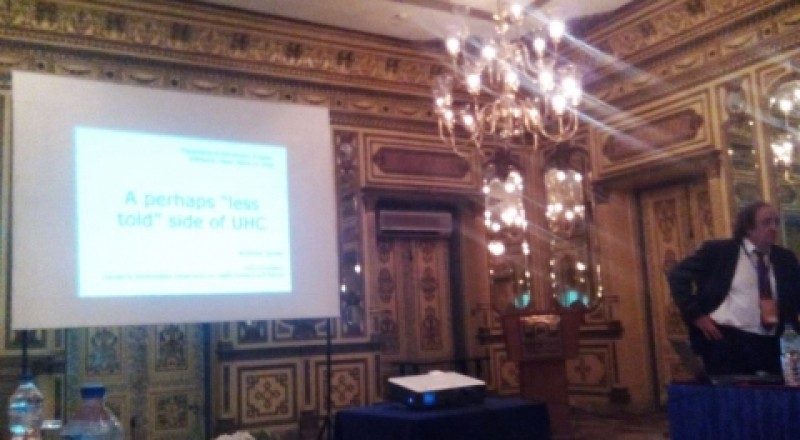Dr Antonio Duran, a noted expert on universal health coverage (UHC) and adviser for WHO is in Nepal discussing with Ministry of Health and development partners about various issues surrounding universal health coverage. On March 16, Dr Duran facilitated an interaction session for Ministry of Health officials – especially represented by Policy Planning and International Cooperation Division (PPICD), Department of Health Services (DoHS) and other divisions and centres. HERD team – represented by Shophika Regmi, Project Manager and Sudeep Uprety, Senior Officer–Research Uptake and Communications also attended the session.
Dr Duran started his presentation with the notion that there are varying perceptions about universal health coverage but the concept itself is not new and has been in practice since the last 3 decades in different forms in many countries. He mentioned that UHC as a concept focuses on providing access to quality health services to the people without the beneficiaries having to bear the out-of-pocket expenditure.
Dr Duran described this as an ideal situation as based on his experience and studies in different countries, UHC is easier to advocate than to implement. In such a context, he highlighted the need for strong system and mechanism. He used an interesting analogy to describe this as, “Even you have the instrument, not necessarily it produces music”, highlighting the importance of health system mechanisms to drive the service delivery along with the infrastructure.
Given that each country has its own contextual realities, Dr Duran emphasized on the need for having more tailored and localized approach in understanding the notion of UHC at the country level. According to him, UHC is dependent upon historical, cultural and political context, fiscal scope and capacity of public administration. Drawing some empirical examples of multi-country studies conducted regarding the modalities of UHC implementation, he recommended governments and policy makers to take a piece by piece rather than aiming for a wholesome approach which could be detrimental to achieving the desired results. He also stressed upon the need for a political endeavor and long-term policy engagement to ensure that the UHC agenda is on board within the health priorities.
Floor Discussion
Post the presentation by Dr Duran, the senior government officials were keen to hear from Dr Duran about the good practices of defining basic health care packages. In response, Dr Duran emphasized upon how governments should concentrate on defining basic health care packages from a utilizers’ perspective rather than a policy makers’ perspective and prioritize health care components based on actual need of the people. Likewise, he also recommended the policy makers to have a clear roadmap as to what sorts of service delivery components need to be centralized and decentralized to ease the implementation at the local level. While doing so, he also highlighted the need to have a strong monitoring, supervision and accountability mechanisms in place.
This short interaction session ended with a note that UHC is not a destination but a direction and the ultimate destination is the improved health and wellbeing of the people. This was perhaps the “less told side of UHC” as he had titled his presentation, providing an alternative view on how UHC can be perceived.



Comments(0)
No comments found.